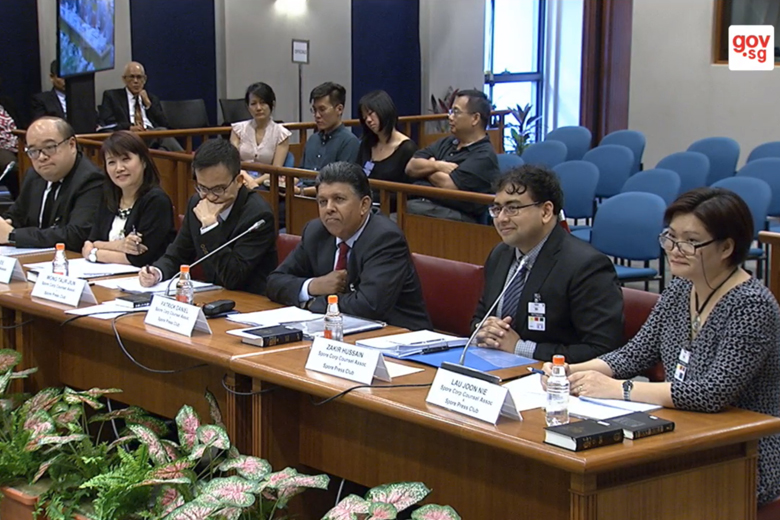Call for clear definition of deliberate untruths
Sign up now: Get ST's newsletters delivered to your inbox

(From left) Allen & Gledhill partner Stanley Lai, Singapore Corporate Counsel Association (SCCA) president emeritus Angeline Lee, SCCA president Wong Taur-Jiun, Singapore Press Club (SPC) president Patrick Daniel, SPC assistant honorary secretary and foreign editor of The Straits Times Zakir Hussain, and SPC vice-president Lau Joon Nie.
PHOTO: GOV.SG
There needs to be a clear understanding of the definitions of deliberate untruths when new laws are drafted against the scourge, representatives from the Singapore Press Club (SPC) and the Singapore Corporate Counsel Association (SCCA) told a parliamentary committee yesterday.
"There will be a lot of grey areas," said SPC president Patrick Daniel. "Those words that you use - deliberate online falsehoods - need clearer definitions. I would submit that in the current codes of practice and legislation, it is not so clear."
Mr Daniel, citing a case that took place in 2012, said a radio station was fined under the Broadcasting Act, which has a clause that says relaying false news is a breach of its code of practice.
"The mistake was that instead of putting up today's news, yesterday's tape was played erroneously. That was deemed false under the clause, when you can in fact argue that it is dated news," he said.
Six representatives from SPC, SCCA and law firm Allen & Gledhill shared their views on the issue, recommending that the committee consider different treatment for different types of untruths, and a way to arbitrate any disagreements to the definition of fake news.
Senior Minister of State for Communications and Information as well as Education Janil Puthucheary sought clarifications from the panellists on their submission, which comprises the views of participants at a recent forum on deliberate online untruths.
SCCA's president emeritus Angeline Lee said: "From our perspective, it is not a question of whether there is sufficient legislation or not, it is the interpretation of what deliberate online falsehoods are... If there are different interpretations, then certainly, it is cause for a lot of discourse."
To this, Dr Janil said other witnesses had given evidence to show how to define the term: by its intent; that it is on an online platform; has to be demonstrably false; and that it must have a significant impact, like the article's ability to affect national security.
"So if we use that framework, you would support further intervention to make sure such falsehoods are stopped?" asked Dr Janil.
Yes, as long as it is nuanced, Ms Lee said, agreeing with Dr Janil that such nuance would not be needed for matters concerning race, religion or the country's sovereignty.
Allen & Gledhill partner Stanley Lai, who helped put together the report, recommended a focus on prosecuting sources of fake news, as "take-down notices" alone may be insufficient. "The strongest measure is to make sure there are equally prohibitive consequences for the creation of the article in the first place," said Dr Lai.


